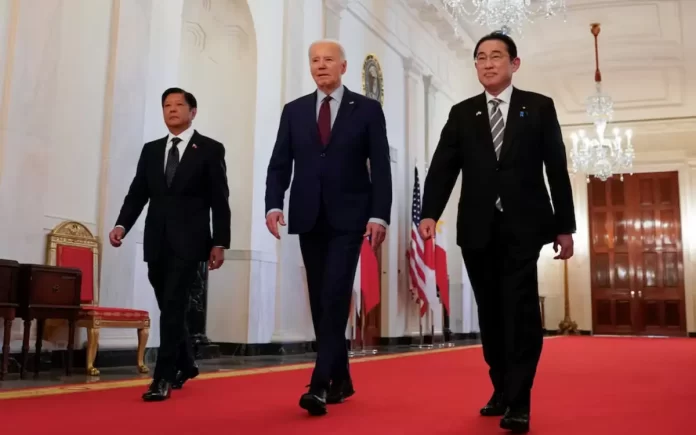Washington: Philippine President Ferdinand Marcos Jr. asserted on Friday that a collaborative agreement among the Philippines, the United States, and Japan would significantly alter the dynamics in the South China Sea and the broader region, emphasizing that it was not directed at China.
“I think the trilateral agreement is extremely important,” Marcos stated during a press conference in Washington, following a meeting with President Joe Biden and Japanese Prime Minister Fumio Kishida in the inaugural trilateral summit.
“It is going to change the dynamic, the dynamic that we see in the region, in ASEAN in Asia, around the South China Sea,” Marcos affirmed, referencing the Association of Southeast Asian Nations.
Also Read | Salman Rushdie Recalls Terrifying Stabbing Incident: Attacker ‘Came Like a Squat Missile
While expressing “serious concerns” about China’s “dangerous and aggressive behavior” in the South China Sea—a crucial waterway facilitating over $3 trillion of annual ship-borne commerce, with numerous maritime disputes among China and other nations—Marcos underscored that the summit aimed at strengthening economic and security ties among Manila, Washington, and Tokyo without targeting any specific country.
Despite China’s assertion of almost the entire South China Sea, a 2016 ruling by the Permanent Court of Arbitration concluded that Beijing’s expansive claims lacked legal merit. Recent confrontations between Philippine and Chinese vessels, involving water cannon usage and heated verbal exchanges, have further heightened tensions.
Also Read | China’s Natural Disasters Rack Up $3.3 Billion Losses in First Quarter, Government Reports
In response to perceived “negative comments” against China, Beijing summoned the ambassadors of Manila and Tokyo, underscoring the escalating rift between China and the Philippines.
This escalating discord coincides with heightened security collaborations between the United States and the Philippines under Marcos’s administration, including expanded U.S. access to Philippine bases, along with burgeoning ties with Japan, expected to culminate in a reciprocal troop pact with Manila.



